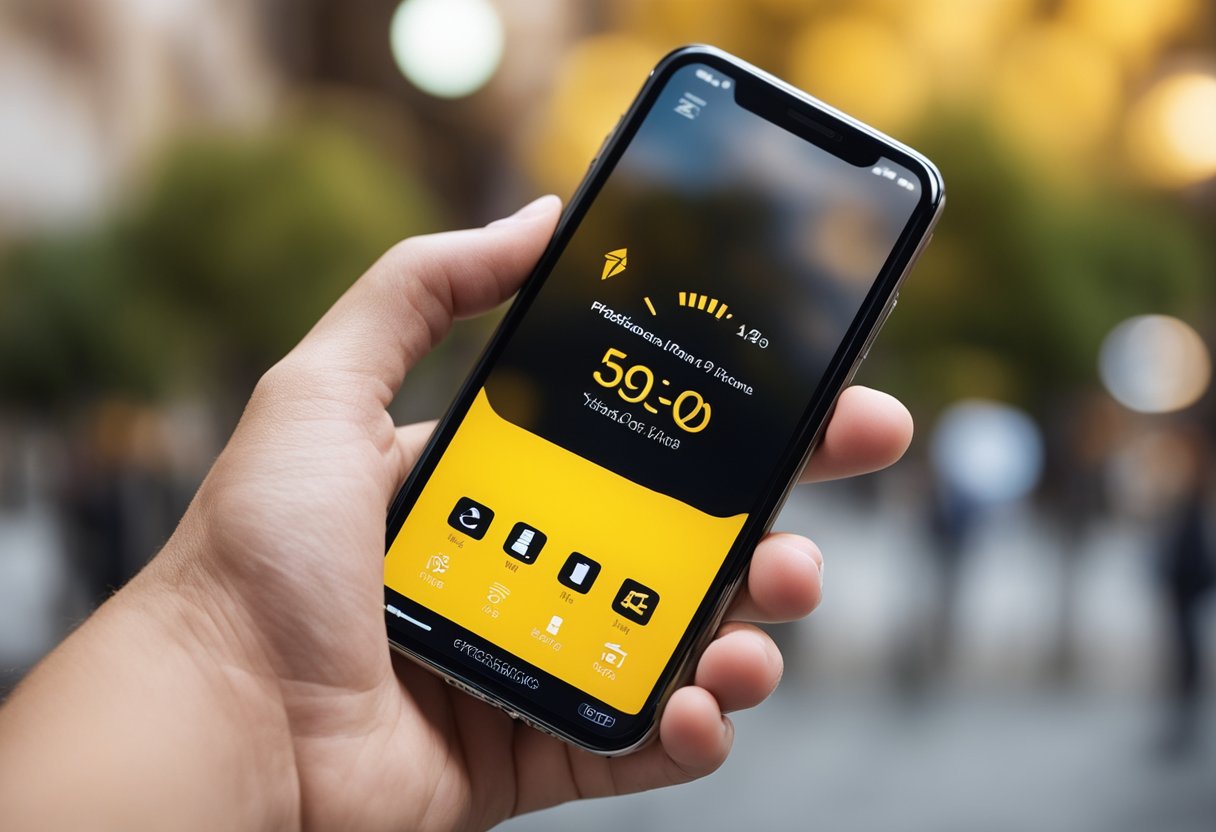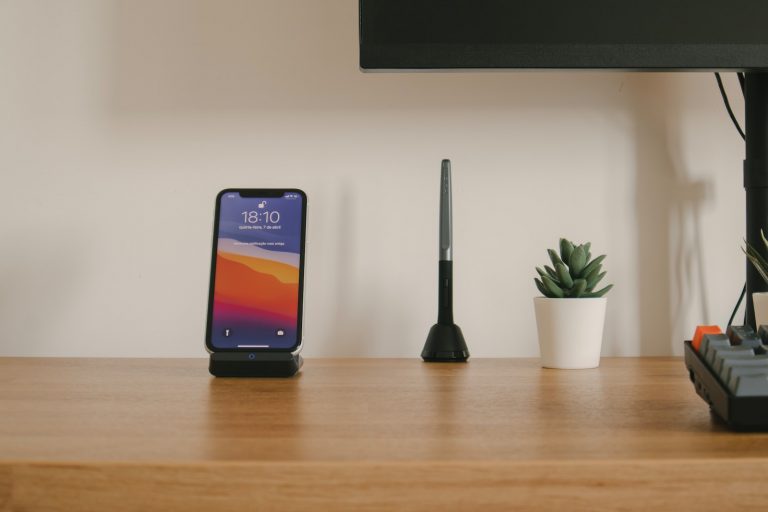When an iPhone’s battery icon turns yellow, it is an indication that the device has entered Low Power Mode. This is a feature designed to extend the phone’s battery life when the charge is running low. By activating Low Power Mode, the iPhone reduces the amount of power it uses by adjusting various settings and functions. For instance, the screen brightness may be lowered, background app refresh can be restricted, and mail fetches can become less frequent.

Low Power Mode is a temporary state that users can manually activate or deactivate. Typically, the iPhone will prompt users to turn on Low Power Mode when the battery level drops to 20%, and it will automatically switch off when the device is charged to 80%. Users may also notice that certain visual effects are less pronounced and that apps might take a bit longer to load when Low Power Mode is enabled.
To disable Low Power Mode and return the battery icon to its normal color, one can easily access the ‘Battery’ settings within the iPhone’s ‘Settings’ app. A simple toggle allows users to switch Low Power Mode on or off according to their power needs or preferences.
Let’s talk about why is my battery yellow on iPhone.
Understanding the Yellow Battery Icon
When the battery icon on an iPhone turns yellow, it signals that Low Power Mode is active, a feature designed to extend battery life when the charge is low.
Low Power Mode Explained
Low Power Mode is a feature on iPhones that reduces the amount of power the device uses when the battery charge becomes low. It is automatically activated when the battery level drops to 20% or can be manually enabled in the device’s settings. While in Low Power Mode, certain functions are scaled back to conserve energy, such as:
- Email fetch: Less frequent checking for new emails
- Background app refresh: Apps won’t update content in the background
- Automatic downloads: Paused to prevent unnecessary power drain
- Some visual effects: Turned off for battery savings
Visual Cue for Battery Saving
The yellow battery icon serves as a visual indicator to the user that their iPhone has entered Low Power Mode. This visual cue is easily recognizable and signifies that the device is engaging battery-saving features. The icon returns to its normal color once Low Power Mode is disabled or the iPhone’s battery is sufficiently charged, typically above 80%. The yellow icon is an immediate and clear notification to users that their device is conserving energy, reflected by changes such as:
- Diminished screen brightness
- Reduced system animations and visual effects to save power
Activating Low Power Mode
When an iPhone’s battery icon is yellow, it indicates that Low Power Mode has been activated. This feature helps extend battery life by reducing background activity and adjusting system behaviors. The user can manually enable Low Power Mode, and certain conditions can also trigger it automatically.
How to Enable Low Power Mode
To manually activate Low Power Mode on an iPhone, users should:
- Open the Settings app
- Tap Battery
- Switch Low Power Mode to on
Alternatively, for quicker access:
- Go to Settings > Control Center
- Select Customize Controls
- Add Low Power Mode to include it in the Control Center for rapid toggling
Automatic Activation Triggers
In certain scenarios, the iPhone may prompt users to turn on Low Power Mode automatically. These triggers include:
- When the battery level falls below 20%
- If the device’s auto-lock feature is engaged to preserve battery effectively
Automatic deactivation occurs once the device is charged above 80%, resuming standard operations without manual interference.
Effects of Low Power Mode
When an iPhone’s battery icon turns yellow, it is an indicator that Low Power Mode has been activated. This mode is designed to extend battery life by reducing power consumption, which is achieved through various changes in functionality and display settings.
Reduced Functionality
- 5G: Access to 5G is limited, allowing the use of lower power requiring connections when available
- Automatic Downloads: Disabled to prevent background data usage and save energy
- iCloud Photos: Updates are paused to reduce both power and data usage
- Background App Refresh: Turned off for apps, which limits their ability to run in the background and update content
- Email Fetch: The frequency of new email checks is reduced. Emails are received less frequently or only upon opening the mail app
- Hey Siri: The voice-activation feature for Siri is disabled, which normally listens for the “Hey Siri” command
Display and Brightness Adjustments
- Display Brightness: Lowered to decrease the energy used by the screen
- Screen Brightness: Automatically reduced to save power
- Brightness: The Auto-Brightness feature adjusts the screen according to ambient lighting to balance visibility and power consumption
- Refresh Rate: The screen refresh rate may be throttled down to conserve battery life
Managing Battery Life and Settings
The lifespan of an iPhone’s battery charge is critical to its daily function. This section focuses on extending battery life and efficiently utilizing the settings menu to manage power consumption and display battery-related information.
Improving iPhone Battery Life
To prolong their iPhone’s battery life, users should:
- Activate Low Power Mode: This can be done by going to
Settings>Batteryand toggling onLow Power Mode. This mode reduces background activity and adjusts system settings to conserve battery life - Adjust Screen Brightness: Lowering the display brightness or enabling Auto-Brightness can help save battery power
- Monitor App Usage: Some apps consume more power than others. Users can check which apps are using the most battery in the settings and close them when not in use
- Update iOS: Apple often includes battery life improvements in new iOS versions. Users should keep their iPhone updated to benefit from these enhancements
Navigating the Settings Menu
The settings menu is where users can manage their iPhone battery settings and display preferences, including:
- Checking Battery Percentage: Users can add the battery widget to the Today View or enable battery percentage display in the status bar, when supported, by going to
Settings>Battery - Understanding Battery Health: Users can view their iPhone battery’s health status to understand its peak performance capability and when it might need to be replaced
- Managing Battery Settings: The Settings app allows users to toggle Low Power Mode and view detailed battery usage statistics
By following these guidelines, users can effectively manage their iPhone’s battery life and settings to ensure their device remains powered throughout the day.
Troubleshooting and Fixes
When an iPhone’s battery icon turns yellow, it indicates that the device is in Low Power Mode. This section will guide users through the process of disabling Low Power Mode and addressing any underlying battery issues. Now that we know why is my battery yellow on iPhone, let’s talk about some troubleshooting tips.
When to Disable Low Power Mode
To take the iPhone out of Low Power Mode, the user should:
- Navigate to
Settings > Battery - Toggle off Low Power Mode
Low Power Mode automatically deactivates when the iPhone is charged to 80% or higher. However, if the user prefers to manually disable it before reaching this battery level, the above steps can be followed. Disabling Low Power Mode will return the battery icon to its standard color and resume normal device performance.
Addressing Battery Issues
If the user suspects a problem with their iPhone battery beyond the Low Power Mode feature, they should consider the following steps:
- Check Battery Health: Go to
Settings > Battery > Battery Healthto see if the battery’s maximum capacity has significantly degraded - Optimize Settings: Some settings may drain the battery faster. Review settings to reduce background app refresh, screen brightness, and push notifications
- Seek Professional Support: If the battery’s health is significantly diminished, or the iPhone experiences rapid drain even outside of Low Power Mode, it may be time to contact Apple Support or visit an authorized service provider
It is important that the device is charged with an official or certified charger to prevent any potential battery issues. Regular maintenance and updates can prevent many common battery-related problems.
Compatibility and Related Devices
In the context of Apple devices, the indication of a yellow battery icon is specific to iOS and is not a feature found across all Apple ecosystems such as macOS or watchOS. The Low Power Mode, associated with the yellow battery icon, is designed to extend the battery life of compatible devices.
Device Compatibility
- iOS Devices:
- iPhone: All iPhone models running iOS 9 or later support Low Power Mode, which turns the battery icon yellow to indicate activation
- iPad: Starting with iPadOS 15, certain iPad models also support Low Power Mode
Low Power Mode is not available on the Apple Watch or Mac computers as the feature is tailored for iOS and iPadOS devices, where battery conservation is often more critical. While macOS and watchOS have their own battery saving features, the specific yellow icon indicator is unique to iPhone and iPad.


0 Comments